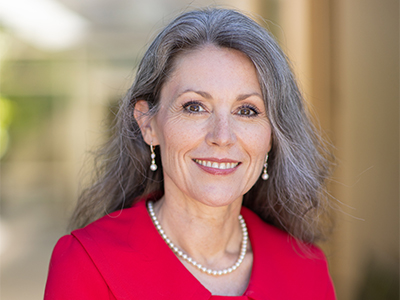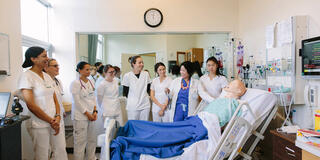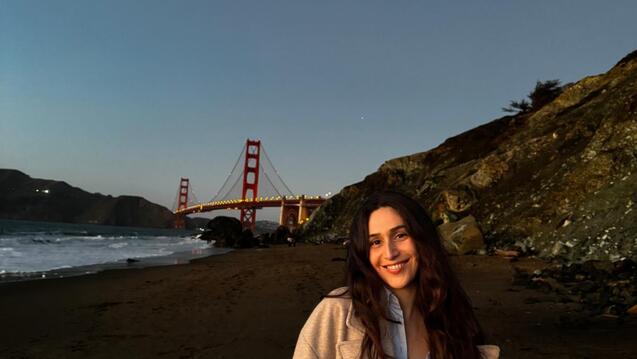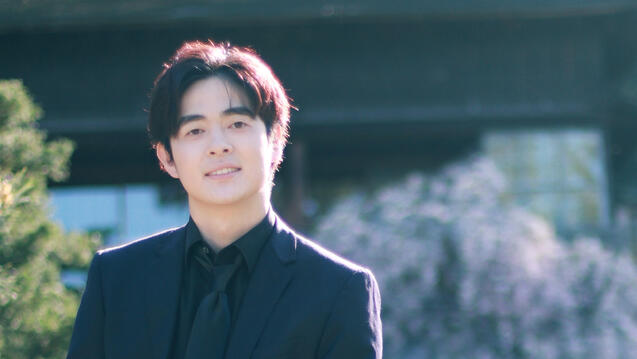
Maximizing Health Education

Eileen K. Fry-Bowers, PhD, JD, RN, CPNP, FAAN, dean of the University of San Francisco (USF) School of Nursing and Health Professions shares with us her strategic vision for the next 10 years as USF transforms the former blood bank center, now known as the Health and Life Sciences Campus, to become a trailblazing facility that will simulate real-world care settings for students to learn and grow from their mistakes.
How do you see the former Blood Centers of the Pacific elevating the School of Nursing and Health Professions (SONHP) and USF in general?
The former blood bank provides a space that will allow us to ensure that we are educating students in the most up-to-date facility with a state-of-the-art education.
Our students will go in and practice as if they were in real-world settings. From an education standpoint, this is really important because we learn when we make mistakes.
It’s an environment that will allow them to be guided by trained faculty. It will provide “virtual reality” and augmented reality situations, where our students can be in an environment where they can react to the virtual world that they see.
We can use all of these things together to really mimic the care environment of a busy ICU, emergency room, or encampment sites. Preparing them for the sounds and sights, and the different ways they might encounter patients.
What are the programs, labs, and clinics on the horizon that really excite you?
All of them – all the programs are going through some sort of revolution. Healthcare changes rapidly. As a result, that means the curriculum needs to change as well.
Healthcare changes rapidly. As a result, that means the curriculum needs to change as well. — Dr. Eileen K. Fry Bowers

We are renewing our nursing curriculum, and it’s happening across the country. Most healthcare curriculums may have mentioned pandemics, back in 2009, but we never would have had our students participate in preparing for a contagious disease or the mass immunization of a COVID pandemic.
We need to ensure that we are changing and adapting. The building allows us to be very nimble – while also allowing students to have that real-world setting.
How will the Health and Life Sciences Campus impact future USF students and the community?
Just from the standpoint of our current students, it’s going to increase our ability to provide them with a world-class education. There is the potential to increase our capacity to meet the needs of our community. Especially since there is such a shortage in nurses and mental health providers, especially in California and in the Bay Area.
You talk about the revolution in whole-person healthcare. What is it and how does the SONHP fit into it?
Whole-person healthcare recognizes that each individual isn’t just the body parts. It's the connection of mind, body, spirit. We need to make sure that all three get attention and nurturing, and we address it by looking at it as a whole. The way we treat one impacts the others. It’s truly about caring using “Cura Personalis”.
That's what makes health professions at USF, kind of second nature to us, to approach the delivery of care with that standpoint. It’s the whole person: whole heart, whole spirit, the whole body. We want to maximize each of those spheres to produce health and maintain it.
It’s the whole person: whole heart, whole spirit, the whole body. We want to maximize each of those spheres to produce health and maintain it. — Dr. Eileen K. Fry Bowers
With the expansion of the SONHP, what are the school’s priorities for the next ten years and beyond?
The knowledge in healthcare changes every 18 months to two years. Our priorities are to keep up with the changes.
We need to make sure that we take those Cura Personalis values and adapt them while keeping up with technology. So students can use the tools to best support the individual they serve, whether it's wearable technologies or utilizing electronic health care records; we want to expose our students to those tools.
Being curious, embracing innovations, being a life-long learner, but grounded in a true sense of health justice and health equity.
Learn more about all the exciting changes within the School of Nursing and Health Professions.


